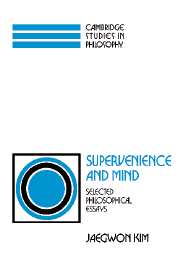Book contents
- Frontmatter
- Contents
- Preface
- Sources
- Part I Events and supervenience
- 1 Causation, nomic subsumption, and the concept of event
- 2 Noncausal connections
- 3 Events as property exemplifications
- 4 Concepts of supervenience
- 5 “Strong” and “global” supervenience revisited
- 6 Epiphenomenal and supervenient causation
- 7 Supervenience for multiple domains
- 8 Supervenience as a philosophical concept
- 9 Postscripts on supervenience
- Part II Mind and mental causation
- Index
8 - Supervenience as a philosophical concept
Published online by Cambridge University Press: 28 January 2010
- Frontmatter
- Contents
- Preface
- Sources
- Part I Events and supervenience
- 1 Causation, nomic subsumption, and the concept of event
- 2 Noncausal connections
- 3 Events as property exemplifications
- 4 Concepts of supervenience
- 5 “Strong” and “global” supervenience revisited
- 6 Epiphenomenal and supervenient causation
- 7 Supervenience for multiple domains
- 8 Supervenience as a philosophical concept
- 9 Postscripts on supervenience
- Part II Mind and mental causation
- Index
Summary
SUPERVENIENCE IN PHILOSOPHY
Supervenience is a philosophical concept in more ways than one. First of all, like such concepts as cause and rationality, it is often used in the formulation of philosophical doctrines and arguments. Thus, we have the claim that ethical predicates are “supervenient predicates”, or that the characteristics of a whole supervene on those of its parts. And arguments have been advanced to show that the supervenience of moral properties undermines moral realism, or that, on the contrary, moral supervenience shows ethical judgments are “objective” after all. And, again like causality and rationality, the concept of supervenience itself has become an object of philosophical analysis and a matter of some controversy.
But unlike causality, supervenience is almost exclusively a philosopher's concept, one not likely to be encountered outside philosophical dissertations and disputations. The notion of cause, on the other hand, is an integral part of our workaday language, a concept without which we could hardly manage in describing our experiences and observations, framing explanationsof natural events, and assessing blame and praise. Something similar can be said about thenotion of being rational as well, although this concept is not as ubiquitous in ordinary discourse as that of cause. Supervenience of course is not unique in being a technical philosophicalconcept; there are many others, such as “haecceity” and “possibleworld” in metaphysics, “analyticity” in the theory of meaning, and the currently prominent concepts of “wide” and “narrow” content.
- Type
- Chapter
- Information
- Supervenience and MindSelected Philosophical Essays, pp. 131 - 160Publisher: Cambridge University PressPrint publication year: 1993
- 18
- Cited by

